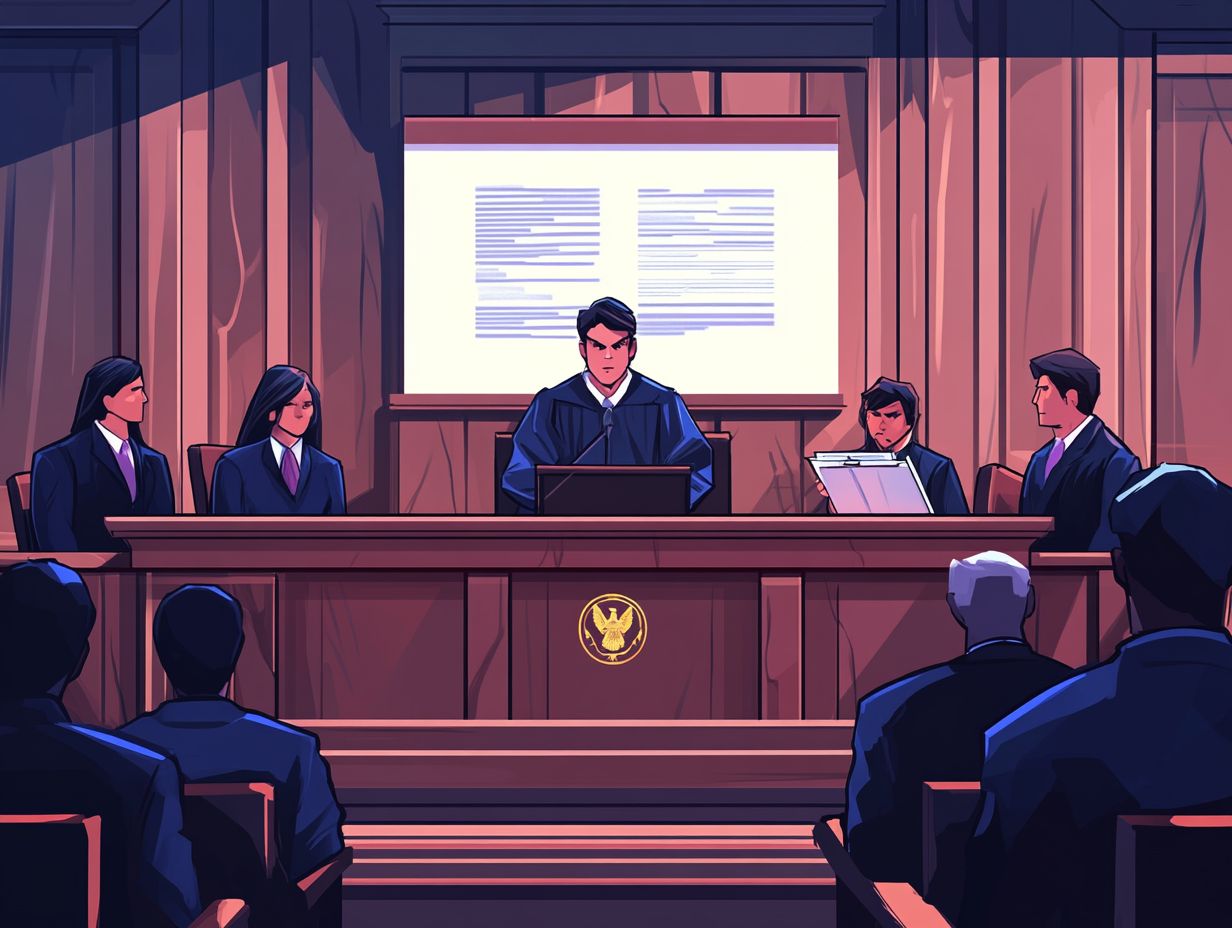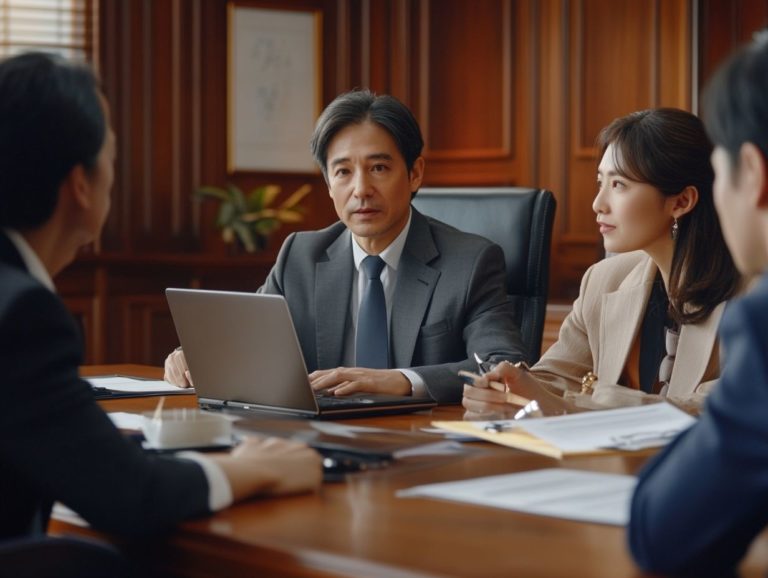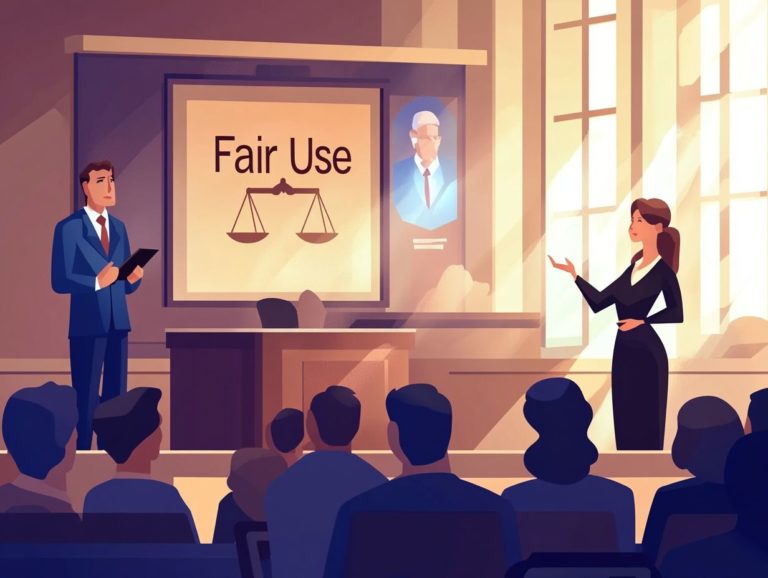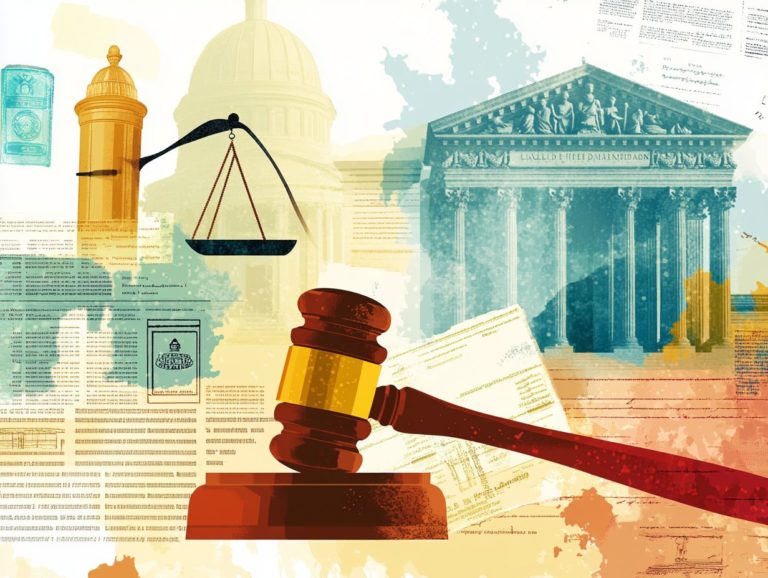How to Conduct a Successful IP Litigation Trial
Intellectual property (IP) litigation is a complex arena where creativity intersects with legal strategy.
This article delves into the essential components necessary for conducting a successful IP litigation trial. It guides you through the trial process step by step, from grasping the intricacies of the legal framework to the critical importance of meticulous preparation and evidence gathering.
Explore effective jury selection strategies and techniques for presenting your case with impact. The pivotal role of expert witnesses in shaping outcomes is also examined.
Whether you re an attorney or an eager observer, this overview equips you with the insights needed to navigate the challenges in IP litigation.
Contents
- Key Takeaways:
- Understanding IP Litigation
- The Importance of Preparation
- The Trial Process
- Selecting a Jury
- Presenting Your Case
- Cross-Examination and Witness Testimony
- The Role of Expert Witnesses
- Closing Arguments and Verdict
- Frequently Asked Questions
- What is IP litigation and why is it important to conduct a successful trial?
- What are the key steps to conducting a successful IP litigation trial?
- How can I prepare for an IP litigation trial?
- Can I represent myself in an IP litigation trial?
- What are some common mistakes to avoid during an IP litigation trial?
- How long does an IP litigation trial usually last?
Key Takeaways:
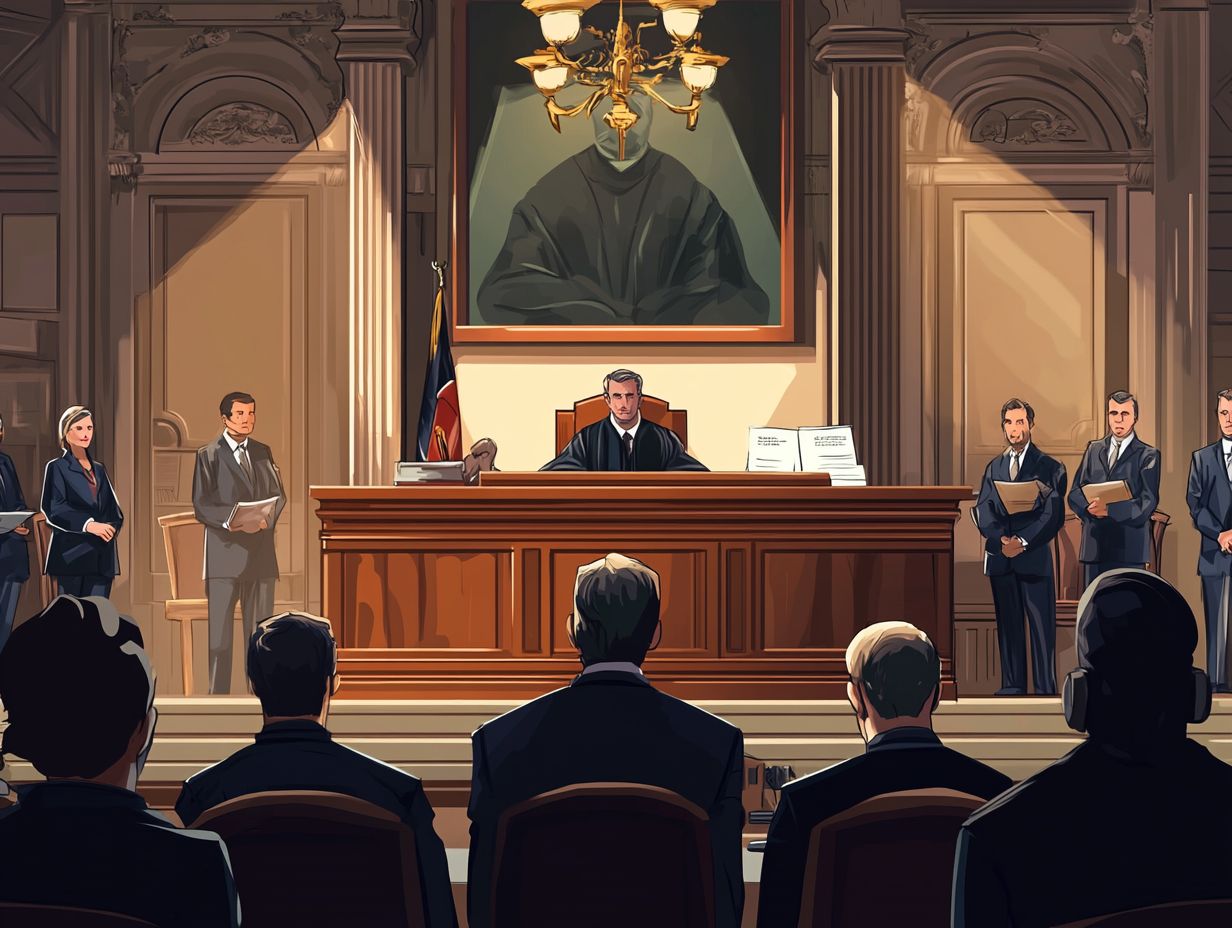
Success in IP litigation starts with solid preparation! Gather strong evidence and build a solid case before entering the courtroom. For more insights, learn how to develop a winning IP litigation strategy. Effective trial techniques, including strategic jury selection, can greatly impact the outcome of an IP litigation trial. Utilizing expert witnesses and skillfully conducting cross-examinations can greatly strengthen your case and improve your chances of a favorable verdict.
Understanding IP Litigation
Grasping the complexities of IP litigation is essential for both individuals and businesses. It touches on various facets of intellectual property law, such as patent litigation, copyright disputes, trademark infringement, and the safeguarding of trade secrets.
For patent holders, adhering to federal regulations and implementing robust legal strategies is crucial when defending their exclusive rights in civil court. The litigation process can be intricate, often characterized by nuanced legal arguments and driven by commercial motivations.
A solid understanding of this domain is critical for any legal team navigating these challenging waters.
What is Intellectual Property Litigation?
Intellectual property litigation encompasses legal disputes over ownership and rights associated with various forms of intellectual property. These include patents, copyrights, trademarks, and trade secrets.
This type of litigation is essential for patent holders, as it safeguards their innovations from unauthorized use or reproduction by others.
In these scenarios, you, as the plaintiff often a patent holder or licensee initiate legal action to defend your rights. The defendants, who may be individuals or companies accused of infringing those rights, work to refute the claims against them.
The intricacies of these cases can cover a wide range, from patent infringement and copyright violations to trademark disputes and trade secret misappropriation. Each aspect requires a nuanced understanding of intellectual property law to navigate effectively.
The Importance of Preparation
Preparation is a critical element of successful IP litigation. It lays the groundwork for a comprehensive legal strategy that can significantly influence the case’s outcome, highlighting the importance of IP education in litigation.
By meticulously preparing, you position yourself to navigate the complexities of the legal landscape effectively.
Gathering Evidence and Building a Strong Case
Gathering evidence effectively is vital when building a strong case during IP litigation. It serves as the backbone of your legal strategy and significantly influences the overall litigation process.
Employing a range of methods like advanced technology tools and systematic strategies enhances the economic value of your case and improves your chances of achieving a favorable outcome.
Digital forensics, data analytics, and surveillance technologies can offer invaluable insights and solid proof in patent and trademark disputes.
When considering the types of relevant evidence, think about including:
- Documentation of previous examples of inventions or creations
- Marketing materials
- Emails that support claims of infringement or usage
Expert testimonies and industry analyses can also strengthen your arguments. They illustrate the true impact of the alleged violations on market competition and innovation.
The Trial Process
The trial process in IP litigation is crucial and unfolds meticulously. For insights on safeguarding your interests, understanding how to protect your IP rights during litigation can be beneficial, as every detail can make a difference in your case.
You will navigate this structured environment, ensuring that every aspect is addressed with precision and clarity.
Key Stages and Procedures
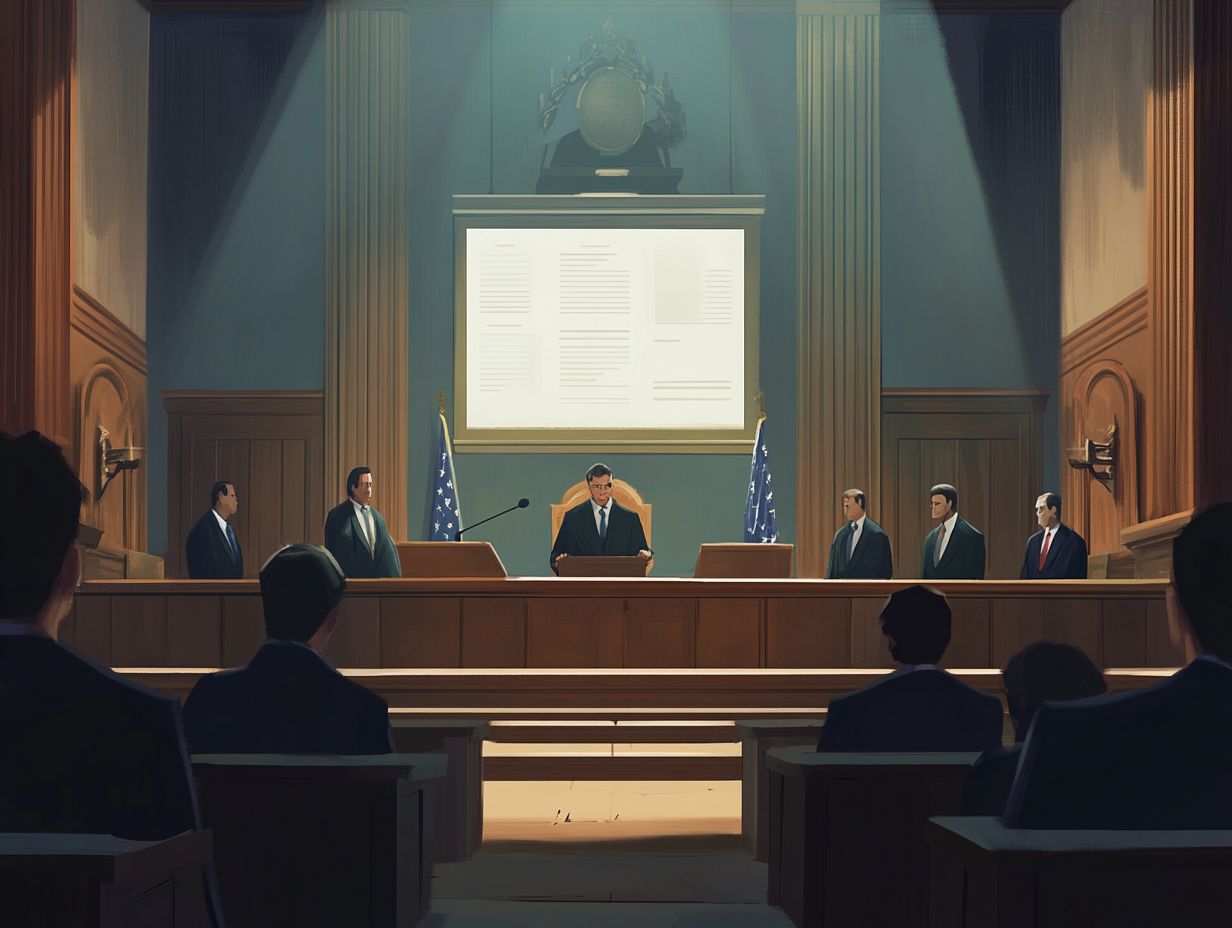
The key stages and procedures in the litigation process are crucial for patent holders and legal teams. They guide you through the intricate landscape of civil court.
Understanding these stages can significantly affect your case’s outcome, especially in high-stakes patent and copyright disputes.
Document requests are vital for both parties. They help reveal evidence that can strengthen claims or defenses.
Once you move beyond the discovery phase, pre-trial motions provide a strategic opportunity to challenge the admissibility of specific evidence or even seek the dismissal of claims. This paves the way for a more efficient trial.
As you approach jury selection, this phase adds another layer of complexity. Careful thought is required to choose jurors who can impartially evaluate the intricate legal arguments, particularly in cases rich with nuanced intellectual property issues.
Selecting a Jury
Selecting a jury is a pivotal element in the trial process of IP litigation. The jury’s perception and understanding can profoundly influence the outcome for both the patent holder and the defendant, making the importance of a strong IP policy in litigation even more critical.
Strategies for Jury Selection
Mastering jury selection can be a game-changer! It is crucial to ensure that the jury is not only impartial but also open to the legal arguments you present during patent litigation.
The jury selection process allows you to evaluate potential jurors’ backgrounds and biases through insightful questioning techniques that reveal their beliefs and values.
By leveraging methods like demographic analysis and psychological profiling, you can customize your approach to select individuals who might be more inclined to support your case. Pre-trial research can unveil patterns in juror behavior, enabling you to refine your strategies effectively.
Your goal is to cultivate a balanced jury pool that remains objective while having an inherent understanding of complex legal arguments.
Presenting Your Case
Your presentation in court can make or break your patent litigation case! For insights on how to navigate this, understanding what to expect during an IP litigation process is the cornerstone of success in patent litigation.
This process requires you to craft compelling legal arguments that are meticulously supported by thorough evidence gathering.
Effective Trial Techniques
Effective trial techniques are essential for shaping your legal strategy as a patent holder. They enhance the impact of your evidence and significantly influence how the jury perceives your case, highlighting the role of attorneys in IP litigation success.
Incorporating storytelling into your presentation can transform complex technical narratives into relatable experiences. This enables jurors to truly understand the significance of the innovations involved.
Visual aids, like charts and diagrams, further clarify intricate patent details, making the information accessible and memorable.
Bringing in expert witness testimony experts who provide specialized knowledge to support your case adds a layer of credibility and authority to your arguments. This helps demystify the nuances of the patent and reinforces the validity of your case.
By thoughtfully integrating these methods, you can build a compelling narrative and cultivate an engaging courtroom atmosphere, ensuring jurors feel informed and invested in the outcome.
Cross-Examination and Witness Testimony
In IP litigation, cross-examination and witness testimony serve as essential tools. They enable your legal team to challenge the credibility of the evidence presented, thereby reinforcing the patent holder’s position.
By skillfully navigating these processes, you can significantly bolster your case.
Strategies for Questioning Witnesses
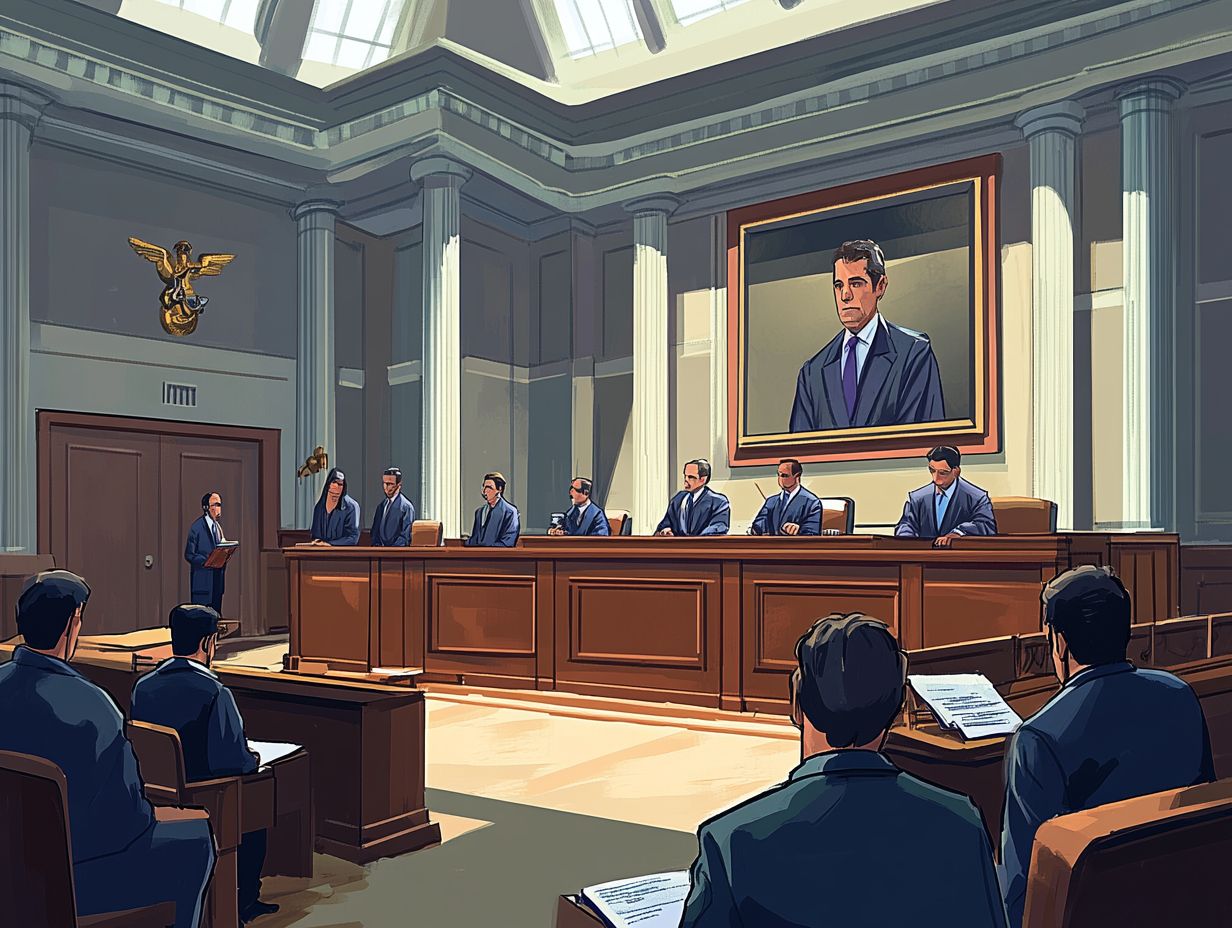
Strategies for questioning witnesses are crucial in eliciting effective testimony that can bolster your legal strategy during litigation. By employing various questioning techniques, you can create a space where witnesses feel at ease sharing vital information.
Open-ended questions invite detailed responses, allowing witnesses the freedom to express their thoughts fully. Conversely, leading questions can be carefully designed to guide a witness toward a specific narrative, helping to shape the story without introducing bias.
It s essential for you to control the narrative during testimony. This ensures the focus remains on relevant facts while minimizing distractions. This method fortifies the presentation of evidence and enhances the overall credibility of your case as a patent holder.
The Role of Expert Witnesses
The role of expert witnesses in IP litigation is absolutely crucial. They provide specialized knowledge and insights that greatly enhance the patent holder’s legal strategy. Their testimony not only adds credibility but also offers detailed knowledge necessary to navigate complex legal landscapes effectively.
Using Experts to Support Your Case
Utilizing expert witnesses in patent litigation offers invaluable insights that significantly strengthen your legal arguments. In this intricate landscape, the types of expert witnesses are diverse, including patent attorneys, technical experts, and market analysts.
Each expert brings unique knowledge, helping to clarify complex technical details or validate the economic ramifications of a patent dispute. Effectively integrating their testimony into your trial strategy is essential. This involves shaping a narrative that connects their insights to the legal framework of your case, ensuring clarity for both the judge and jury.
When selecting the right experts, consider their qualifications and experience in the relevant field. You need to evaluate their ability to convey complex concepts clearly, along with their credibility and any potential biases, as these factors could influence their testimony significantly.
Closing Arguments and Verdict
Closing arguments represent a pivotal moment in the IP litigation process, where you summarize the essential aspects of the case for the jury. This is your opportunity to reinforce your legal strategy, ensuring that your points resonate before they deliberate on the verdict.
Final Statements and Jury Deliberation
Final statements during jury deliberation are pivotal, encapsulating the essence of the case and steering the jury toward a favorable outcome for the patent holder. These concluding remarks reinforce your main arguments and clarify any complex evidence that may have emerged during the trial.
The dynamics of jury deliberation significantly influence the final decision. Jurors often rely on the persuasive power of these arguments to reconcile differing viewpoints. A well-crafted final statement is crucial in swaying their collective judgment, guiding them through any confusion or doubts.
By summarizing key evidence and its relevance effectively, you can elevate your case in the jurors’ eyes, driving them toward a resolution that favors the intellectual property owner.
Frequently Asked Questions
-
What is IP litigation and why is it important to conduct a successful trial?
IP litigation is the legal process for resolving disputes over intellectual property rights, such as patents, trademarks, and copyrights. Conducting a successful IP litigation trial is important as it protects the valuable intellectual property of individuals and businesses, ensuring their rights are enforced.
-
What are the key steps to conducting a successful IP litigation trial?
The key steps to conducting a successful IP litigation trial include thorough preparation, understanding the legal issues and arguments, presenting strong evidence, and demonstrating effective communication and negotiation skills.
How can I prepare for an IP litigation trial?
To prepare for an IP litigation trial, research the intellectual property laws related to your case. Additionally, learning how to prepare witnesses for IP litigation can be crucial. Gather and organize all relevant evidence and work with experienced lawyers to develop a solid legal strategy.
Can I represent myself in an IP litigation trial?
You can represent yourself in an IP litigation trial, but it’s best to get help from a qualified lawyer. An experienced attorney knows the ins and outs of intellectual property law and can guide you on how to navigate patent litigation, boosting your chances of success.
What are some common mistakes to avoid during an IP litigation trial?
Avoid these mistakes to strengthen your case. Research the laws thoroughly, gather solid evidence, and communicate clearly to prevent setbacks.
How long does an IP litigation trial usually last?
The length of an IP litigation trial varies based on the case’s complexity and the court’s schedule. Typically, trials can last from several months to a few years.

